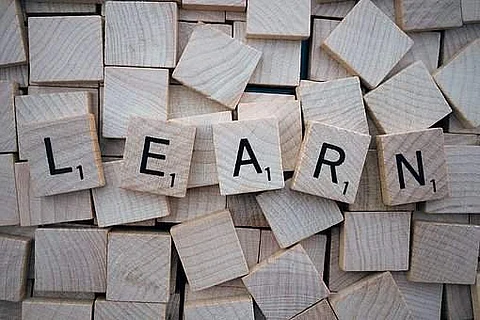

“Without grammar very little can be conveyed; without vocabulary, nothing can be conveyed.” - David Wilkins
Even if sentences are not grammatically correct, we can understand the meaning of them to a certain extent. It is easy to guess the meanings of the sentences below though they are ungrammatical:
1. John and Mary goes to church every day. (go)
2. He can be able to do it. (use either ‘can’ or ‘is able’)
3. Why it is important to teach vocabulary to our students?
4. Can you tell me what do you do? (what you do)
5. She will not be interested in play with you. (playing)
To learn any foreign language effectively, it is important to know both the grammar and the vocabulary of the target language. Words are an indispensable part of any language. Using the right words is important to communicate our message effectively. Look at the sentences below:
1. My right hand is itching. I need to consult a leather specialist. (skin specialist or dermatologist)
2. He fell on his niece and prayed. (knees)
3. Where is your phone? It is in the backside … (back of..)
In the sentences above, ‘leather specialist’, ‘niece’ and ‘backside’ are inappropriate words. They completely change the meanings of the sentences. For example, the meaning of the word ‘backside’ is a person’s buttocks. The correct expression is ‘in the back of..’. The apt term for ‘dermatologist’ is ‘skin specialist’ and not ‘leather specialist’. The expression ‘fall to one’s knees’ means to kneel down in a show of respect whereas the phrase ‘falling on one’s niece’ has a sexual connotation.
What does it mean when we say we know a word? Knowing a word means recognizing it in its spoken and written forms, knowing its different meanings, knowing it's part of speech (noun/verb/adjective,…), being able to pronounce it properly, being able to use it correctly, etc. Many words in English have different meanings. For example, the word ‘meat’ referred to all solid food in Old English; now it means animal flesh (after 14th century); it also means ‘the principal part of something’ as in the example below:
The meat of the discussion is that teachers should teach vocabulary in a creative and effective manner.
Recently, I served as a resource person for a webinar on ‘Teaching Vocabulary’ to a group of Afghanistan teachers. Earlier, the teachers had shared with me the challenges they faced while teaching vocabulary. Here are a few of the challenges: Learners do not remember all the words that were taught by the teacher. Some learners do not show interest in learning new words. Learners struggle to use words appropriately in different situations and contexts.
Most English language learners want to develop their vocabulary and highly motivated ones follow different strategies to improve their vocabulary. One of the strategies is learning how to guess the meanings of unknown words from context. Look at the sentences below:
1. Ruqsana is a fun-loving girl. She enjoys cracking jokes and making people laugh. Being with her is like being in paradise. We all enjoy her kreokoke.
2. What is the name of the dakad? It has colourful wings and it flies beautifully.
3. He is a great namidian! I am a fan of his paintings. Recently, one of his paintings was sold at 1 million dollars.
4. Today is our grandma’s birthday. Come on, let’s jinglate.
Good readers can guess what the words kreokoke, dakad, namidian, and jinglate mean in the sentences based on context clues. I checked with some young learners and they were able to substitute the words kreokoke, dakad, namidian, and jinglate with company, bird, artist (painter), and celebrate.
Constant exposure to the English language helps learners master their vocabulary. Reading is the best way to build one’s vocabulary skills.
“Teaching vocabulary lists is inefficient - the time is better spent reading alone.” - Stephen Krashen
